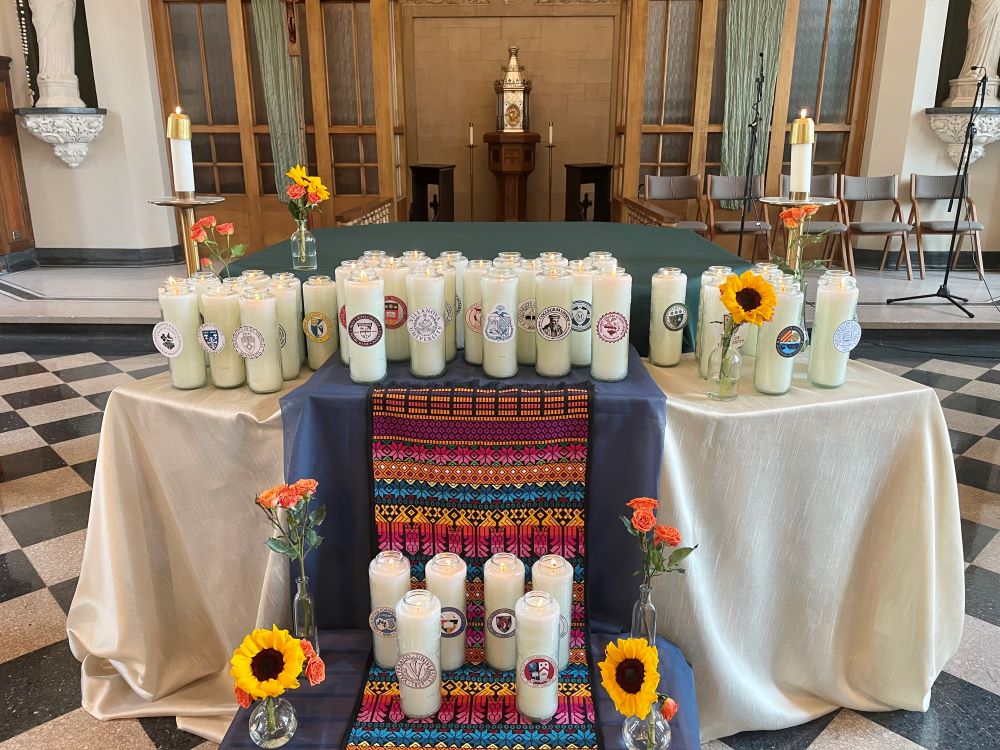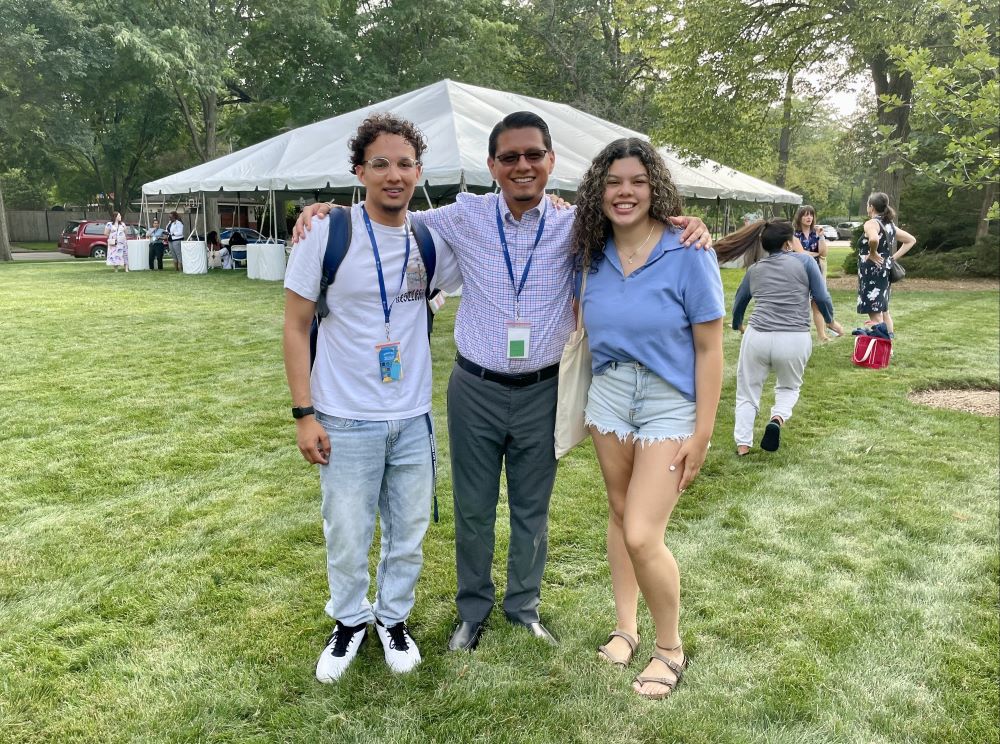
The opening session of "El Futuro is Here" at Dominican University included a procession at Rosary Chapel with candles bearing the seals from all the colleges and universities represented at the conference. (Courtesy of Milton Javier Bravo)
Whenever I listen to musica andina, like the Bolivian band Los Kjarkas, I remember being a young child hearing for the first time la sampońa, el charango, el tambor and the guitar, and how the sounds of these instruments transported me to a deeper awareness of an ecospirituality. Pope Francis' 2015 encyclical "Laudato Si', On Care for Our Common Home," has reminded me of these same elements of my cultural and mestizo heritage, and my Indigenous roots, through his intellectual theological move toward centering the Global South and highlighting culturalidad (culturality) away from the European intellectual paradigm toward those on the margins.
The theological enterprise that we've engaged in for centuries has its roots in a Greco-Roman, Hellenistic, Western cultural heritage. In many ways, our schools, universities, parishes and dioceses in the United States still function within this cultural framework. La teologia andina (Andean theology) not only allows us to change the framework with which we speak about faith and do theology, but also asks us how cultural elements of a people are integrated into the faith community and how the identities of a people are taken seriously and intentionally.
For those communities at the peripheries of ecological degradation, this requires a deconstruction of a Western-theological framework, and a reconstruction of a theological framework rooted in the culture and cosmic view of Indigenous communities (for example the Pan-Amazonian region) and their Indigenous identity (indigeneity).
With the publication of Laudate Deum ("Praise God") expected on Oct. 4 — the feast of St. Francis of Assisi and the final day of the annual "Season of Creation" — Francis again will have an opportunity to expand our understanding and cosmic view in a way that elevates the narratives, experiences, heritages and traditions of people from the ecological peripheries.

Milton Javier Bravo, center, is vice president for mission and identity at Loyola University Maryland. He is pictured with Miguel Meza and Saira Ardon, students from Edgewood College in Madison, Wisconsin, during the outdoor concert during the "El Futuro is Here" conference at Dominican University. (Courtesy of Milton Javier Bravo)
To center this type of theological reflection on integral ecology requires learning about la culturalidad of a specific people and their Indigenous identity. I hope to see Pope Francis in one track highlight heritage, roots, traditions, symbols and language, and in another track highlight how this culturalidad shapes understanding of faith and theology as an expression of an Indigenous identity at the intersection of other identities, to include sociopolitical and economic factors.
Here in the United States, synodal processes such as the Encuentros, or the U.S. Conference of Catholic Bishops' "Journeying Together," have attempted to do just this: connect cultural families to their heritage/roots in order to come to a deeper understanding of the intersections of identities and how they shape our theological and pastoral work. Along these lines, Dominican University in August hosted the third “El Futuro is Here” conference, focused on building culturally responsive ministries at Catholic colleges and universities.
I was part of the national leadership team, which brought together hundreds of theologians, campus ministers, scholars, administrators and students to River Forest, Illinois. After praying together and initiating our conference with a special Dominican blessing offered by the Dominican Sisters of Sinsinawa, we set off for Chicago's Pilsen neighborhood. Once filled with European American culture, Pilsen has become home to a vibrant Mexican and Mexican American culture and heritage, and the home for many families that send their students to Dominican University.
Rather than host a conference that remained on a college campus or in hotel conference rooms, our goal was to bring people into the communities that Dominican University serves, walk the same streets, visit the same spaces that shape these young adults' lived experiences, and spend time learning about the cultural history of this neighborhood rich in Latino culture.
We spent time in a local parish that performs an annual live reenactment of the Stations of the Cross. We visited the local Cristo Rey High School and the National Museum of Mexican Art. All these experiences provided the context to further understand la culturalidad of this neighborhood and how it shapes the identities of college students who attend Dominican University nearby.
Catholic theologian and historian Massimo Faggioli recently said on Twitter/X: "Pope Francis' encyclical 'Laudato Si' Part 2' will land in October in a US Catholic Church where many US bishops have pretended that 'Laudato Si'' (Part 1) never happened."
La teologia andina needs to be understood further for our collective grasp of Laudato Si' and whatever comes next. This requires real work on the part of those providing ministries. It requires us to move from the sacraments into the sacramental reality of a people. It requires us to see how both parish and church experiences are shaped by the culture of a people, and the layers of identities that culture carries and holds dear.
The question we must constantly ask in a more multicultural, pan-ethnic U.S. Catholic Church is: How do our cultures and identities shape and get shaped by our experiences of faith?
Advertisement
There is one musica andina song in particular that puts these elements together for me. In "El Arbolito de mi Destino," Los Kjarkas' lead songwriter, Gonzalo Hermoso González, writes about the ecological process of planting a tree, which he associates with the path of his personal destiny. As the tree grows and bears fruit, it remains happy and full of life. But, as the seasons turn, so do the colors of the leaves, and the promise of a future that comes with the planting of a new tree faces the reality that we all face: how fragile life really is. The song ends with the following refrain:
Ese arbolito querido
El que guardaba mis sueños
Ahora refleja mi vida
Son extraños los misterios(That beloved little tree
The one that sheltered my dreams
Now mirrors my life
Mysteries are strange)
With Laudate Deum, I think Pope Francis will once again ask us to see how the destiny of our ecosystems are integrally connected to our collective human destiny. I think he will invite us to dream again of a future that takes seriously environmental degradation and social-racial injustice. I think he will once again exhort us to take practical steps toward integral ecology in order to protect our most vulnerable communities. But above all, I hope he will continue to urge us to protect the dignity of all people and preserve their cultures and identities in our collective work toward integral ecology.




